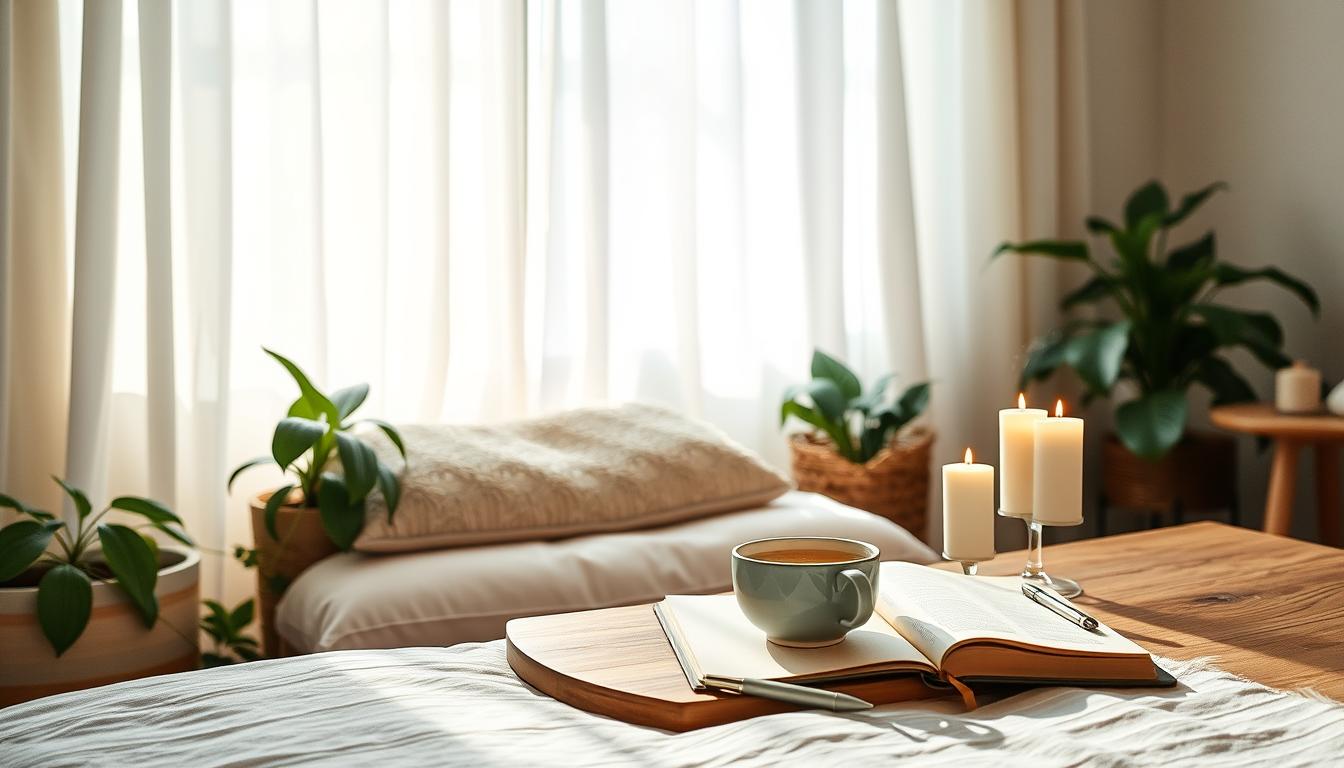“The greatest weapon against stress is our ability to choose one thought over another.” – William James, American philosopher and psychologist
In today’s fast world, finding peace can seem hard. But, daily rituals can bring calm into our lives. They help us slow down and live more mindfully. By adding simple habits to our day, we can find inner peace and manage stress better.
Key Takeaways
- Daily rituals can create pockets of calm and tranquility in busy lives
- Incorporating mindfulness practices, such as meditation and gratitude journaling, can significantly improve mental well-being
- Establishing a morning routine with intention can set a positive tone for the day
- Mindful movement, like yoga and walking, can help relieve stress and foster a deeper mind-body connection
- Evening wind-down rituals promote better sleep and overall relaxation
Understanding the Power of Daily Rituals for Mental Peace
Daily rituals greatly impact your mental clarity and emotional well-being. Studies show that activities like meditation and journaling can lower stress and boost mood. They also improve your sense of self-care.
The Science Behind Daily Practices
Research in The Lancet Psychiatry shows that active routines lead to better sleep and mental health. A study in the Journal of Abnormal Child Psychology found that family routines help kids feel safe and less impulsive.
How Rituals Shape Our Mental State
Doing various activities daily, like exercise, can greatly improve your mental well-being. Spiritual rituals, in particular, can reduce stress and anxiety. This leads to a better overall sense of well-being.
Benefits of Consistent Practice
Studies show that daily rituals, both spiritual and secular, have many benefits. They can reduce anxiety, improve focus, and make you more resilient. Rituals also bring people together, enhancing your mental clarity and emotional well-being.
“The preparation and stress involved in organizing rituals like music festivals are seen as worth it due to the excitement, anticipation, and connectedness they provide.”
By embracing daily rituals, you can improve your mental clarity, emotional well-being, and self-care. This leads to a more fulfilling and balanced life.

Morning Mindfulness: Starting Your Day with Intention
Starting your day with mindfulness can make it calm and focused. Just 5-10 minutes of meditation or deep breathing can cut down anxiety and clear your mind. This simple habit can make you face the day with strength and peace.
Research shows mindfulness meditation boosts attention and problem-solving skills. It keeps these benefits for up to five years. Adding mindfulness to your morning, like mindful brushing or yoga, improves brain function. It helps with thinking, feeling, and overall health.
Pranayama breathing, like Trataka, lowers stress and boosts focus. These morning rituals increase awareness and calm. They help you feel more connected and clear.
Starting your day with meditation, gratitude, or yoga sets a strong foundation. Embracing Morning Routines and Meditation Techniques makes your day more grounded. These Morning Mindfulness practices bring deep peace and clarity all day long.
“The morning is the best time of day to establish an intentional routine, as it sets the tone for the rest of your day.”

Daily Rituals for a Calm Mind: Essential Practices
Starting your day with inner peace and clear thoughts is possible. It begins with daily rituals. These can range from mindfulness to physical activities. They deeply impact your well-being.
Let’s look at some key rituals. They help manage stress, improve mental clarity, and strengthen self-care habits.
Meditation and Breathing Exercises
Spending a few minutes each day on meditation and deep breathing is beneficial. The 4-7-8 method or box breathing can be done anywhere. They offer quick relief by calming your nervous system.
These practices help you pause, reconnect with your breath, and find mental clarity.
Gratitude Journaling
Writing down three things you’re thankful for each morning is a powerful ritual. It’s a simple way to focus on the good things in life. This practice boosts happiness, sleep, and immunity.
Movement and Physical Activities
Adding physical activities to your daily routine can change your life. Yoga, stretching, or walking are like moving meditations. They connect your mind and body, reducing stress and boosting energy.
Whether it’s a morning yoga session or an afternoon walk, these self-care habits are key for stress management.
“The greatest weapon against stress is our ability to choose one thought over another.” – William James
By making these daily rituals a part of your life, you’ll find inner peace and clear thoughts. Start small and let these practices become a natural part of your day. Embrace the power of daily rituals for stress management, mental clarity, and self-care.
Creating Sacred Spaces for Inner Peace
In our fast-paced lives, setting aside special areas for Peaceful Living and Self-Care Habits can change us. A sacred space at home can make your daily routines better and bring inner peace. It could be a cozy corner, a meditation spot, or a calm area that’s your personal retreat.
Think about what makes your space peaceful. Use soft colors, comfy seats, and candles for a calm vibe. Add things that mean a lot to you, like art, crystals, or an altar. This space helps you remember to slow down and be mindful, keeping your mind calm.
“A sacred space offers a unique opportunity for transformation and serves as a reminder to prioritize self-care, self-reflection, and spiritual growth.”
Investing in your sacred space can really improve your life. Studies show it can lower stress, boost creativity, and help you grow. By making a space that matches your Peaceful Living and Self-Care Habits, you’re connecting more with yourself.
Your sacred space should feel like a safe, calm place. Try out different things and make it your own. As you use this space every day, let it be a place of peace, renewal, and self-discovery.
Mindful Movement and Body Connection
Mindful movement is key to finding inner peace and reducing stress. Yoga, gentle stretching, and walking meditation connect the mind and body. They improve both physical and mental health.
Yoga and Gentle Stretching
Yoga and gentle stretching can change your mental health for the better. They help release physical tension and clear your mind. Studies show that 10-15 minutes of these activities can help you better handle your emotions.
Contemplative teacher Willa Blythe Baker says this awareness can help you manage your feelings better.
Walking Meditation Techniques
Walking meditation helps calm your mind. It focuses on the sensations of walking, like your feet touching the ground. This brings you back to the present moment, letting go of worries.
Biomechanist Katy Bowman says movement is crucial for our mental state. It’s like the backbone of our behavior.
Movement as Meditation
Any mindful movement can be a form of meditation. Activities like Tai Chi, Qi Gong, and simple stretching can focus your mind. They help you connect with your body in motion.
Zindel Segal says being aware of your experiences can help you accept them. This leads to inner peace.
Adding mindful movement to your daily life boosts your Mindfulness Practices and Stress Management. It creates a deep bond between your mind and body. This brings calm and clarity, improving your overall well-being.
Nature Connection and Grounding Practices
Connecting with nature can greatly improve your mental state. Studies show that being outdoors reduces stress and boosts mental health. Simple acts like walking in a park or gardening can calm you down. It’s all about being present and letting nature soothe you.
Walking barefoot on grass or sand is a powerful grounding technique. It helps you feel more grounded and in the moment. Doing this daily can lower stress, reduce inflammation, and improve sleep.
- Watching the moon regularly can ground you. It reminds us of life’s natural cycles and affects our mood and energy.
- Drinking herbal tea mindfully reconnects you with nature’s healing. It offers a calm moment in your day.
- Caring for plants daily teaches patience and mindfulness. It makes you feel connected to nature and accomplished.
Mindful movement in nature, like walking meditation or yoga, is grounding. Mindful walking in nature clears your mind and brings you back to the present. It enhances your connection with nature. These activities help you focus on your senses and live in the moment.
| Grounding Practice | Benefits |
|---|---|
| Nature Meditation | Calms the mind and improves grounding by allowing individuals to listen to nature sounds and feel more connected to the earth’s rhythms. |
| Cooking with Seasonal Ingredients | Helps individuals align themselves with the natural rhythms of the earth and provides nourishment based on the season. |
| Mindful Breathing with Nature Sounds | Helps calm the mind and anchor thoughts in the present moment, creating a grounding environment. |
By adding these Peaceful Living and Mental Clarity practices to your day, you can deepen your connection with nature. This can lead to the inner peace you’re looking for.
Evening Wind-Down Rituals for Better Sleep
As the day ends, it’s key to make your space calm. This helps your mind and body get ready for sleep. Evening rituals can make you feel refreshed and ready for the next day. Let’s look at some easy ways to relax and improve your Stress Management and Self-Care Habits.
Creating a Relaxing Bedroom Environment
Your bedroom should be a peaceful place. Start by making the lights dimmer. Use soft, warm colors to create a calm feel. Add calming scents like lavender or chamomile with essential oils or candles.
Keep the room at a comfy temperature, around 65°F (18°C). Choose good bedding and pillows for the right mix of support and softness.
Digital Detox Strategies
In our digital world, it’s important to have a “no-phone” zone in your bedroom. Make a rule to keep phones out and turn off notifications an hour before bed. This break from screens helps your brain relax.
Bedtime Mindfulness Practices
- Try a short, guided meditation or deep breathing to calm down.
- Read a calm, non-stimulating book to relax your mind.
- Do some gentle stretching or yoga to release tension.
- Write in a gratitude journal to reflect on the day.
These evening rituals help you smoothly move from the day to sleep. By focusing on Stress Management and Self-Care Habits, you’ll sleep better and feel better overall. Start these practices and enjoy peaceful, refreshing sleep.
Incorporating Mindful Eating and Drinking Rituals
Mindful eating and drinking can change how you enjoy your meals. By focusing on taste, texture, and smell, you make eating a mindful act. It turns nourishing your body into a peaceful, intentional experience.
Begin your day with a mindful tea or coffee ritual. Take your time, enjoy each sip, and use all your senses. This sets a mindful tone for the day. At mealtime, sit down, turn off distractions, and really taste your food. Mindful eating improves digestion, helps with weight management, and makes meals calm moments.
A study by Olson and Emery looked at 19 mindful eating studies. Thirteen of these studies showed people lost weight. While they couldn’t link mindful eating directly to weight loss, it encourages enjoying the moment and the food.
Make these Mindfulness Practices and Self-Care Habits part of your daily life:
- Slow down and fully engage your senses while eating and drinking
- Avoid distractions and focus on the present moment
- Listen to your body’s hunger and fullness signals
- Plan meals ahead to maintain healthy eating habits
- Create a mindful kitchen environment to encourage better choices
- Balance emotionally comforting foods with nutritionally healthy options
By adding mindful eating and drinking to your daily life, you can change how you view food. It brings a deeper sense of presence, gratitude, and well-being.
| Mindful Eating Practices | Benefits |
|---|---|
| Slow down and savor each bite | Improved digestion, better weight management |
| Remove distractions during meals | Increased presence and enjoyment of the experience |
| Listen to your body’s hunger and fullness signals | Healthier eating patterns and overall well-being |
| Plan meals and create a mindful kitchen environment | Encourages consistent healthy eating habits |
“Mindful eating is a process-oriented behavior focusing on the individual’s experiences in the moment, aiming for appreciation of the food rather than restrictive guidelines.”
Conclusion: Embracing Daily Rituals for Lasting Peace
Daily rituals for a calm mind are key to lasting peaceful living. They bring moments of calm in our busy lives. Practices like morning meditation and gratitude journaling help us find balance.
These rituals also help us grow, relax, and connect with ourselves. They are powerful tools for spiritual well-being.
Inner peace isn’t about avoiding challenges. It’s about how we face them. Studies show rituals can improve mental health, reducing anxiety and boosting happiness.
Having a set time for rituals, daily or weekly, makes them a comforting part of your life. It turns them into a habit.
Check your rituals every two to four weeks to see if they’re working. Simple acts, like enjoying a quiet morning tea or meditating, can become powerful rituals. They improve your well-being and sense of peaceful living.
FAQ
What are the benefits of incorporating daily rituals for a calm mind?
Daily rituals greatly improve mental and emotional health. They can lower stress, boost mood, and increase happiness. Practices like meditation and journaling reduce anxiety and improve focus.
How can morning mindfulness set the tone for the day?
Morning mindfulness, like meditation or deep breathing, reduces anxiety and boosts focus. It helps start the day calmly and resiliently, setting a positive tone.
What are some essential daily rituals for a calm mind?
Key daily rituals include meditation, breathing exercises, and journaling. Physical activities like yoga also help. These practices connect the mind and body, reducing stress and improving clarity.
How can creating a sacred space enhance daily rituals?
Having a sacred space at home, with calming elements, boosts daily rituals. It reminds you to prioritize self-care and mindfulness, making it easier to maintain calm practices.
How can mindful movement and nature connection contribute to inner peace?
Mindful movement, like yoga or walking meditation, strengthens the mind-body connection. It improves mood and reduces stress. Nature also calms the mind, reducing stress and promoting well-being.
What are the benefits of having an evening wind-down ritual?
Evening rituals, like a relaxing bedroom and digital detox, help transition to restful sleep. They improve sleep quality and overall well-being.
How can mindful eating and drinking rituals contribute to inner peace?
Mindful eating and drinking, focusing on taste and aroma, transform meals into peaceful moments. It improves digestion, helps with weight management, and makes meals calming.




























































